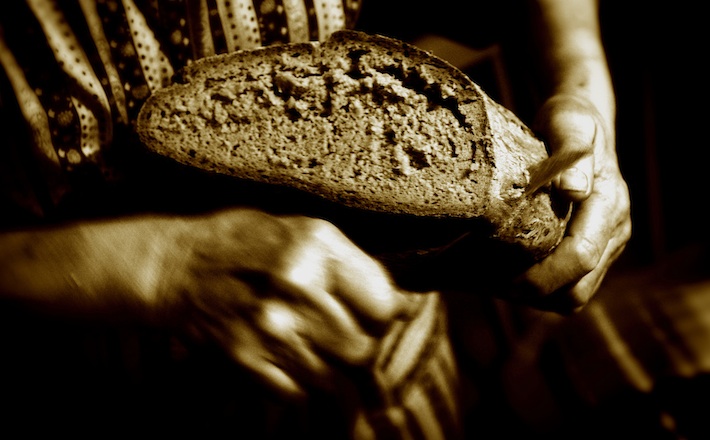Commentary on Exodus 16:2-4, 9-15
What does it mean to know God?1
Depending on the individual, the congregation, or even the denominational tradition, knowing God can sometimes be reduced to an intellectual exercise. This text tells us that the knowledge of God is connected to an experience of God, and especially experiencing God’s provision. Knowing God is also expressed in obeying God, an act that can cycle back to a deeper knowledge of God.
The topic of knowing, experiencing and obeying God in this account is set within the story of the Israelites’ “murmuring” against Moses and Aaron in the wilderness, and God’s provision of quail and manna. As is typical for Hebrew syntax, the verb begins the verse, setting the stage for what will happen, “and they murmured.” This word only occurs in the wilderness wandering texts of Exodus 15-17 and Numbers 14, 16-17, and Joshua 9:18, and can also be translated as “grumble,” or “complain against.”
Though the object of their complaint is Moses and Aaron, their human leaders, in verses 6-8 (which are not in the lectionary reading) Moses acknowledges that they are really complaining against God. It is important to remember that these texts — where the Israelites murmur — are not merely critiques of people who voice their concerns to God. The Psalms are full of laments, which list out complaints to and even about God in very specific ways. Additionally, the content of the people’s murmuring at this point is legitimate: they are hungry and need food. Thus, the problem is not that the people murmur; the problem is that they do not believe.
God responds to the people’s murmuring with the promise that bread will be rained from heaven — a remarkable, direct response to their need. But verse four also lets us know that with the gift of bread comes a test. God will see if the people will obey God’s instruction or not, instructions which include the command to only gather as much as they need to eat (verse 16), and not to leave any for the next day (verses 19-20).
Of course, they do not obey, and their lack of obedience tests the patience of both Moses and God. But it would seem that the disobedience is not only stubbornness or recalcitrance: they do not know God enough to trust God. This problem is foreshadowed in their song of praise from the previous chapter. They acknowledged that the Lord is a God like no other (Exodus 15:11). They do not fully understand who the Lord is, or what God is able to do. Even if they remember that God is their deliverer, they have not yet experienced again and again that God is also their provider.
By skipping from verse 4 to verse 9, the lectionary moves immediately from God’s words to Moses about the promise of bread to Moses and Aaron assembling the people to draw near (qirbû line) to the Lord. Brevard Childs explains that this is a technical term referring to an encounter at a sanctuary (cf. Exodus 27:21, Numbers 16:17, etc.), probably meaning the tent of meeting.2 But while Aaron is still speaking to the people, the glory of God suddenly appears in the cloud.
God, who is made manifest, says three significant things to Moses. First, God confirms what Moses told Aaron to say in verse 9, that God heard their murmurings. Second, God tells Moses to tell the Israelites what Moses had previously indicated (in verse 8, not in our lectionary selection), that God will provide meat in the evening and bread in the morning. In the full text of the chapter, then, the content of God’s speech to the people has already been anticipated by what Moses has told them, and God confirms that which Moses had promised. Third, God tells Moses that it is when the people’s bellies are filled with the food that God provides them that they will know who the Lord is, their God.
We do not have to wait at all for the fulfillment of God’s promise of bread and meat, made in verse 12, for verse 13 explains that quail comes in the evening, and manna comes with the dew of the morning. Verse 14 gives a brief description of the manna, comparing it to frost. Its name is related to the Israelites’ question, “what is it?” or, man hû? in Hebrew. Moses responds to their confused surprise by spelling out that it is God’s promised gift of bread.
Numbers 11 also tells about God providing manna and quail to the Israelites in the wilderness, but in that chapter, the gift of food is bracketed by stories about God’s anger with and judgment against the Israelites (Numbers 11:1-3, 33-35). Psalm 78:30-31 describes the occasion in Numbers vividly: “But before they had satisfied their craving, while the food was still in their mouths, the anger of God rose against them and he killed the strongest of them, and laid low the flower of Israel.”
In this chapter, and in the lectionary’s selection of verses, the main point is that God provides food in the wilderness in the form of bread from heaven. Of course, in the gospel reading from John, Jesus makes it clear that the manna from heaven in the wilderness is not the true bread from heaven that gives life to the world. Instead, Jesus himself is the bread of life, and as he identifies himself as that bread, he promises that whoever comes to him will not go hungry (John 6:35). Many see Jesus spiritualizing the food from the Old Testament. But perhaps his promise connects with the Exodus text more directly by affirming that knowledge of God is connected to the way God provides for specific needs.
Notes
1 Commentary first published on this site on Aug. 5, 2012.
2 Brevard Childs, Exodus. Philadelphia: Westminster Press, 1974, 287.


August 5, 2018